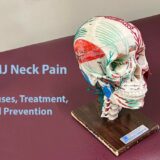FACIAL NERVE PAIN
 Facial Nerve Pain: Diagnosis and Treatment
Facial Nerve Pain: Diagnosis and Treatment
What is Trigeminal Neuralgia?
Trigeminal neuralgia (TN), also called tic douloureux, is a chronic facial nerve pain condition that causes extreme, sporadic, sudden burning, or shock-like face pain. The pain seldom lasts more than a few seconds or a minute or two per episode. The intensity of pain can be physically and mentally incapacitating. TN pain is typically felt on one side of the jaw or cheek and has different symptoms from tension and cluster headaches. Episodes can last for days, weeks, or months at a time and then disappear for months or years.
In the days before an episode begins, some patients may experience a tingling or numbing sensation or a somewhat constant and aching pain. The attacks often worsen over time, with fewer and shorter pain-free periods before they recur. The intense flashes of pain can be triggered by vibration or contact with the cheek (such as when shaving, washing the face, or applying makeup), brushing teeth, eating, drinking, talking, or being exposed to the wind.
TN occurs most often in people over age 50, but it can occur at any age, and is more common in women than in men. There is some evidence that the disorder runs in families, perhaps because of an inherited pattern of blood vessel formation. Although sometimes debilitating, the disorder is not life-threatening.
The presumed cause of TN is a blood vessel pressing on the trigeminal nerve in the head as it exits the brainstem. TN may be part of the normal aging process but in some cases, it is associated with another disorder or painful condition, such as multiple sclerosis or other disorders characterized by damage to the myelin sheath that covers certain nerves.
Persistant Facial Nerve Pain
Is there any treatment?
A neurologist or oral-facial pain specialist is the best person to seek consultation from for the correct/proper diagnosis of trigeminal neuralgia.
Because there are a large number of conditions that can cause facial pain, TN can be difficult to diagnose. But finding the cause of the pain is important as the treatments for different types of pain may differ. Treatment options include medicines such as anticonvulsants and tricyclic antidepressants, surgery, and complementary approaches. Typical analgesics and opioids are not usually helpful in the treatment of the sharp, recurring pain caused by TN. If medication fails to relieve pain or produces intolerable side effects such as excess fatigue, surgical treatment may be recommended.
Several neurosurgical procedures are available. Some are done on an outpatient basis, while others are more complex and require hospitalization. Some patients choose to manage TN using complementary techniques, usually in combination with drug treatment. These techniques include acupuncture, biofeedback, vitamin therapy, nutritional therapy, and electrical stimulation of the nerves. How a person responds to chronic pain may be quite different from how another individual does.
Facial nerve pain commonly lasts anywhere from a few seconds to as long as two minutes per episode. These attacks can occur in quick succession, sometimes in volleys lasting as long as two hours. Don’t delay professional diagnosis and pain management for yourself or someone who knows who is facing this medical condition. Get help. Our clinic provides treatment for multiple types of pain disorders.
Living with trigeminal neuralgia can be very challenging. It may have a huge impact on a person’s quality of life, resulting in problems such as weight loss, isolation and depression that can trigger chronic pain.
What is the prognosis?
We’ll let you know how our pain specialist can help. Call 763-577-2484 or click the “Request Appointment” button to Schedule an Appointment Today!
DISORDERS WE TREAT
OROFACIAL PAIN
The specialty of Orofacial Pain is concerned with the prevention, evaluation, diagnosis, treatment, and rehabilitation.
READ MORE ›
HEADACHES
There are four types of headache: vascular, muscle contraction (tension), traction, and inflammatory.
READ MORE ›
FACIAL NERVE PAIN
Trigeminal neuralgia is a chronic pain condition that causes extreme, sporadic, sudden burning or shock-like face pain.
READ MORE ›
TMJD
TMJ is a group of conditions that cause pain and dysfunction in the jaw joint and the muscles that control jaw movement.
READ MORE ›
ORAL APPLIANCE THERAPY
Sleep apnea is the most common sleep disorder, affecting nearly 1 out of every 8 individuals.
READ MORE ›
NECK PAIN
Neck muscles can be strained from poor posture — whether it’s leaning over your computer or hunching over your workbench.
READ MORE ›


 Facial Nerve Pain: Diagnosis and Treatment
Facial Nerve Pain: Diagnosis and Treatment